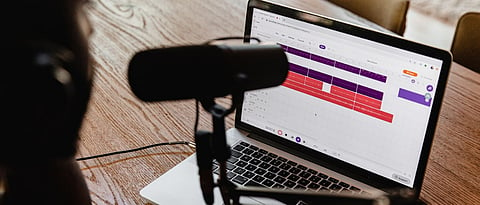

It is a known fact that the COVID-19 lockdown forced everyone (and everything) into a complete and irreversible standstill. However, media, amongst other industries, suffered irrecoverable damage in particular. Most of us who were heavily dependent on content found that there was an acute shortage, owing to the restrictions on production during the outbreak. As the graphs appeared to be dismal for most of the businesses, the podcast industry seemed to be thriving despite the logistical shortcomings. Even with little to no commute on the cards for these listeners, producers found the podcast industry growing a lot faster than usual.
The work-from-home phenomenon
Users stuck at home during the lockdown found themselves turning to podcast shows, but there was a lot more to it than just 'boredom' that added numbers to the statistics. "It's been interesting, and what we're seeing is a here is general growth, but not at the same level," says Mr Amit Doshi, Founder of IVM Podcasts. "Earlier, people used to consume content during their daily commute. Now, with the commute out of question for most of our audience, people have begun listening to podcasts during work from home," he adds.
Along with exponential growth, Amit has also noticed a shift in the kind of content that people would initially listen to. "We're seeing a lot more growth in the comedy section," he says. However, he is also quick to add that people either listen to light programmes that aid in taking their mind off the current issues or search for COVID-19 related content. "Content which has been very pandemic specific has also seen a considerable number of listeners, especially the shows where there are conversations about COVID-19 itself," he states.
Amit also believes that podcasts, just like any other media, are habit-forming. "People find themselves listening to Cyrus Barocha even after the lockdown was announced because they like hanging out with their host," he says. "Yes, they may have to find their way around it to be able to adjust to the timings, but all in all, the growth we've witnessed testifies how users are willing to listen to their favourite content."
Speaking about the pandemic, Amit believes that times have changed for everyone -- irrespective of their field. "I think one of the major challenges was that we were so stuck up about recording in person. And we often would not record with guests that were available to us from outside the city. However, the lockdown has given us the confidence to pursue a lot more work from home and has allowed us to record a lot more with people who are not around," he says.
Taking the situational route
Curating content during a full-fledged pandemic comes with a set of shortcomings. "At Gaana, we have been working relentlessly over the last couple of months to innovate to produce relatable and original non-music content that engages discerning Indian audiences," says Mr Prashant Agarwal, CEO of Gaana. Apart from witnessing a surge in listeners, Prashant has also observed genre-specific growth during the lockdown. "There has been a significant surge in podcast content consumption across all genres including storytelling, devotional, self-help and kids among others," he tells us. "This is aligned with the overall increase in traffic as people are increasingly turning to music streaming platforms to relax and soothe themselves in times of such crisis," he adds.
Gaana also found users appreciating myth-busting programmes, which was a new phenomenon for the platform. "Whether it's about boosting their morale and health by tuning to "The SOS Show with Suchita" that demystifies mental health and bursts myths around it, or Paranormal Reality by Jay Alani that will spook you out or "Love Diet by Dr Shikha Sharma" who shares tips on nutrition, and diet to stay fit making it your couple goals. There was no stopping the audience during the first two months of the lockdown," he states.
A push towards more useful content
Curating shows around sports, Rahul Pandey, Sports Jockey at Sports Flashes found himself at the very brink of his career when the lockdown was announced, however, he realised how the podcast industry is on the verge to find a new meaning. "I am someone who started his career during the lockdown and it has been great so far. It is an incredibly under-talked industry, and we really need to figure out all that we can do with it," he tells Sakal Times. "I began following the ratings of my own show during the start of the COVID-19 lockdown, and it was incredible to see the number of people that listen to the podcast on a daily basis, especially in metropolitan cities," he adds.
Rahul also notes how the increasing screen-time has caused the listeners to get exhausted with the regular content, thereby creating a shift in the industry. "Thanks to Jio, we now have access to all sorts of content, and people are getting fed up over having too many visuals and not enough news-worthy content," he says.
"A podcast is the only place where both the host and the producers have only one thing -- words. People actually want to listen to things for pure knowledge," he tells us. "The podcast industry is one of those places where they can go to."
According to Rahul, the podcast industry, if utilised well, can also be the next television industry ahead in time. Ïf we utilise it the way we utilised the television in the late nineties, then there is a genuine chance that we can make good use of it," he adds. "With television channels now coming up with sensational, substandard content, there's perhaps a hope that content can go back to being useful again," he says.
With the situation returning to normalcy, the media will perhaps see another wave with its new subscribers taking a backseat again. However, that would be another challenge for the producers to tackle in the months ahead.
